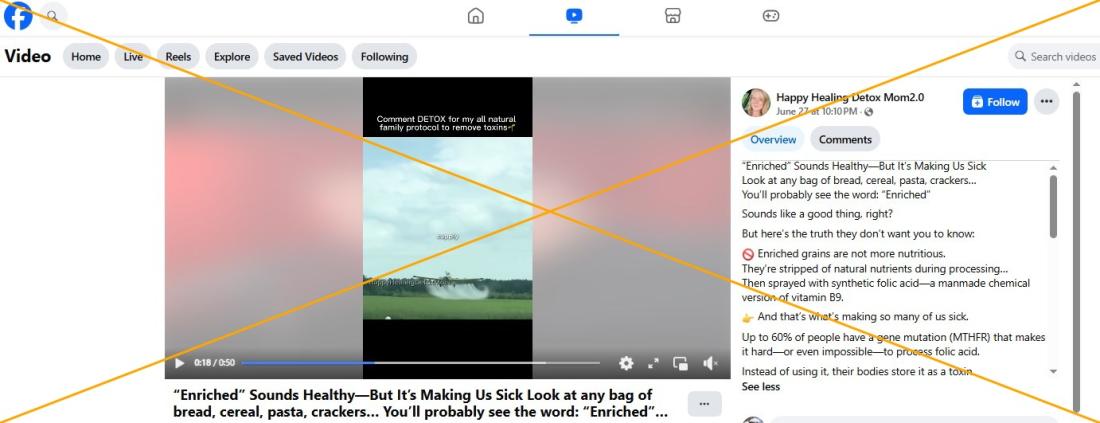
Misleading claims on folic acid fortification spread online
- Published on July 8, 2025 at 22:52
- 5 min read
- By Marisha GOLDHAMER, AFP USA
"Enriched grains are not more nutritious. They're stripped of natural nutrients during processing... Then sprayed with synthetic folic acid -- a manmade chemical version of vitamin B9," claims a June 27, 2025 Facebook post. "Up to 60% of people have a gene mutation (MTHFR) that makes it hard -- or even impossible -- to process folic acid. Instead of using it, their bodies store it as a toxin."
On TikTok, a man claims: "Studies show that 90 percent of humans consuming supplements or enriched flours have unmetabolized folic acid in their body and this can lead to reduced immune function. It's actually associated with some cancers in some people."

Folate is a B vitamin found in a wide variety of foods including dark green leafy vegetables, beans and eggs (archived here)
Folic acid is a synthetic form that is added to foods and supplements and has been found to be better absorbed (archived here).
The body needs folate to make DNA and modify proteins (archived here). It is particularly important during pregnancy, to help prevent neural tube defects, such as spina bifida (archived here). However, to meet the daily recommended intake from unfortified foods, a person would have to eat as many as 12 cups of raw spinach.
The US Public Health Service highly recommends supplementation ahead of conception and throughout early pregnancy, as most issues happen in the first four weeks of gestation (archived here).
Due to the risk of low folate intake, several countries have adopted regulations requiring fortification of breads, cereals and pasta with folic acid -- a move that significantly lowered the incidence of neural tube deficits in the United States and Canada after the rules came into effect in 1998 (archived here, here, here, here and here).
The US Centers for Disease Control and Prevention (CDC) estimates that folic acid fortification prevents about 1,300 neural tube defects annually (archived here).
"Overall, folic acid fortification has been an important public health program," said Walter Willett, professor of epidemiology and nutrition at the Harvard TH Chan School of Public Health (archived here).
Recommended daily amount
Outside of pregnancy, most adults are recommended to get 400 micrograms of folate daily (archived here).
On its website, the US National Institute of Health (NIH) says folate deficiency is currently rare in the United States, but people with conditions that lower nutrient absorption, such as celiac disease and inflammatory bowel disease, or those who consume high volumes of alcohol may not be getting enough. Getting too little folate can result in megaloblastic anemia, a blood disorder that results in abnormally large red blood cells.
Harvard's Willett pointed to strong evidence that in addition to reducing neural tube deficits, folic acid fortification reduces the risk of stroke if dietary sources are low (archived here).
Stroke mortality rates in the United States and Canada between 1990 and 2002 were compared with England and Wales where fortification was not implemented, showing the regulation reduced deaths from stroke (archived here).
"We have plenty of things to worry about these days, but folic acid in fortified foods is not one of them," Willett told AFP in a July 2 email.
"Of course, too much of a good thing can have adverse effects, so taking more than 400 micrograms per day is not advisable without a medical reason," he said.
The NIH's Office of Dietary Supplements recommends the upper daily limit of folic acid be set at 1,000 micrograms because studies have shown that consistently consuming higher amounts can mask a vitamin B12 deficiency (archived here).
Genetic variants
Several posts mention the MTHFR gene, which provides instructions to the body on how to process folate (archived here). In many cases, the accounts are selling supplements or nutritional "coaching" while misinforming by telling people a common genetic variation will leave them unable to process folic acid.
The CDC says on its website: "People with an MTHFR gene variant can process all types of folate, including folic acid" (archived here). It explains that folic acid intake is more important than MTHFR genotype for determining the amount of folate in a person's blood.
Asked about whether people need to test for MTHFR gene variants, the American College of Medical Genetics and Genomics sent AFP its practice guidelines that say: "There is growing evidence that MTHFR polymorphism testing has minimal clinical utility" (archived here).
This is echoed by the University of North Carolina Children's Hospital on its website. "Established medical guidelines do not recommend MTHFR testing because these gene changes are so common in the general population and do not directly cause medical issues or impact clinical care," it says (archived here).
Cancer risk
Raphael Cuomo, professor of medicine at the University of California, San Diego (archived here), told AFP there is some evidence in favor of folic acid supplementation for cancer prevention.
"There is an increased risk for cancer if you're getting less than 200 micrograms per day," he said on July 7, pointing out that folate is necessary for healthy cellular function.
A review of research by the Cancer Treatment Centers of America also found "low or deficient folate status is associated with increased risk of many cancers" (archived here).
A benefit to ensuring there is enough folate in the diet was also found in relation to breast cancer.
A paper based on data from the Nurses' Health Study, which follows hundreds of thousands of women to examine chronic disease, found the known risk for breast cancer associated with alcohol consumption "may be reduced by adequate folate intake" (archived here).
Some posts recommend people avoid folic acid in favor of methylfolate, which is the biologically active form of folate, but Cuomo said "there is no evidence to really suggest that any particular form of folate is going to result in the development of cancer."
There was initial concern that post-fortification the trends for colorectal cancer, which had been declining, reversed (archived here), but Harvard's Willitt said this was carefully followed, and that there is "a reduction in risk of colorectal cancer with higher intake of folic acid."
Cuomo said the concern appears to be most for patients who have had cancer or have pre-cancerous lesions.
If very high doses of folic acid are taken long-term, he said there is "scant evidence of increased risk of recurrence of cancer," but that it is more likely via regular taking of supplements over consumption of fortified foods.
"The fact of the matter appears to be that the public health benefits from folic acid fortification dramatically outweigh theoretical risks," Cuomo said.
Read more of AFP's reporting on health misinformation here.
Copyright © AFP 2017-2026. Any commercial use of this content requires a subscription. Click here to find out more.
Is there content that you would like AFP to fact-check? Get in touch.
Contact us
